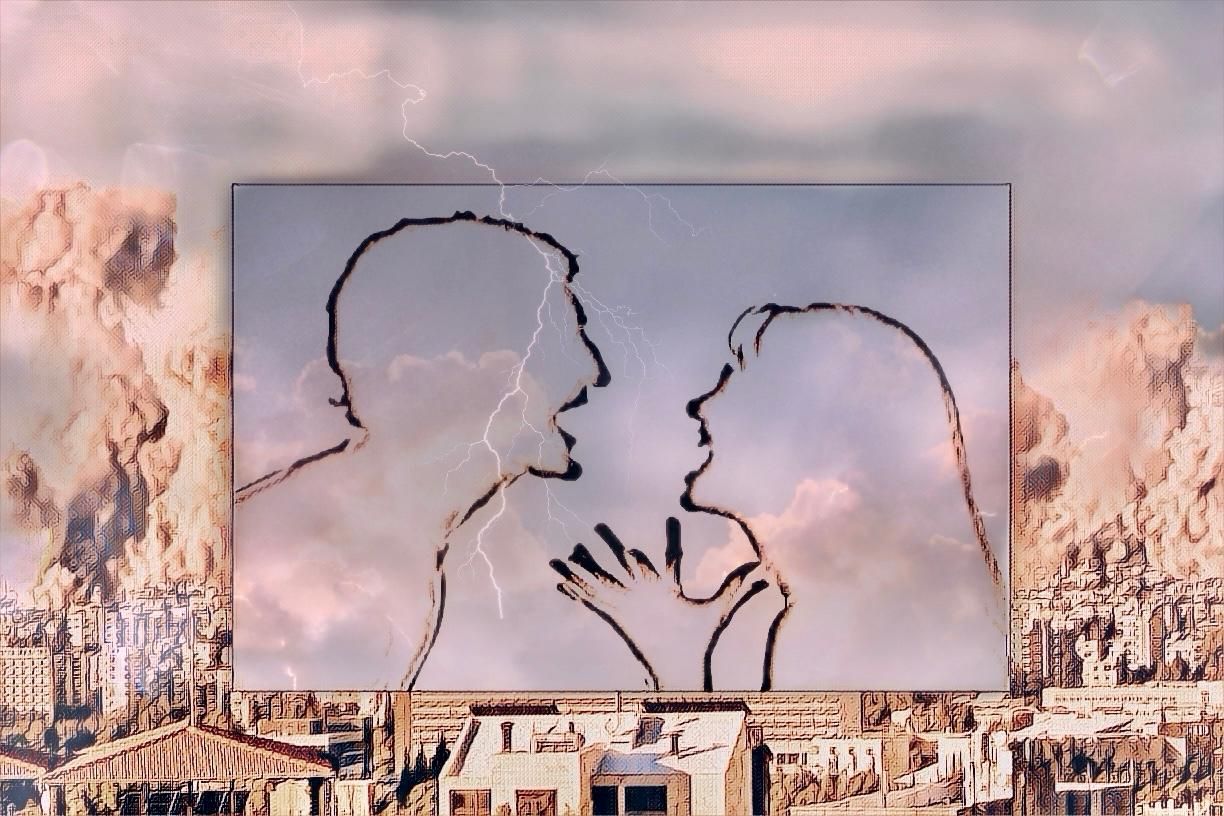
In Lebanon, the war seeps into the intimacy of couples, disrupting their equilibrium. Through a testimony that reveals the toll of the conflict on a relationship, we offer an analysis of the dynamics at play in this bond, shattered by trauma.
Testimony
"Once, our apartment at Galerie Semaan was a peaceful haven. Now, it feels like a real pressure cooker. The atmosphere in our home has completely changed. My husband yells over the smallest things. I do too, actually. Yesterday, we argued simply because the kids were making too much noise while playing— as if noise could still bother us with the constant explosions shaking the southern suburbs.
We no longer speak to each other; we only shout. ‘Put down that phone!’ ‘Stop watching the news!’ ‘Be quiet, I’m trying to hear if those are drones!’ The kids watch us, their eyes filled with fear.
Last week, I suggested we go to my sister’s place in Jounieh. My husband exploded: ‘You want us to leave everything behind? Become refugees?’ We argued for hours. The kids hid in the bathroom.
At night, no one really sleeps. We jump at the slightest noise. My husband chain-smokes on the balcony. I count the explosions. Sometimes, I catch him moaning, but he denies it. We’ve become total strangers.
My mother-in-law calls ten times a day, insisting we come to her in Tripoli. My husband hangs up every time. Last Friday, when the airstrikes hit Ain el-Remmaneh, I screamed that I was taking the kids and leaving. He slammed the door. Two hours later, he came back. We didn’t even discuss it. We can no longer communicate without shouting.
Analysis
This testimony highlights the devastating impact of being thrust into a state of war on both the couple and the family dynamic. The home becomes a tense, high-risk environment, with adults on edge. Overcome by constant anxiety and a sense of weariness, parents watch helplessly as their relationships unravel. Shouts replace thoughtful conversation, as each struggles to contain their own fears.
Freud emphasized that the trauma of war stems from a dual threat: an ever-present "danger of death" and a "denial of love" caused by individual violence, particularly in response to the sight of death and destruction. In this context, not only can pre-existing marital conflicts worsen, but it is the intrusion of "traumatism" into daily life that disrupts the normal functioning of the couple.
It is crucial to remember that the conflict triggered by external factors already exists on an intrapsychic level. It represents the continuous struggle between the desires of the id, which seek gratification, and the moral conscience, which enforces the prohibitions essential for communal life. In times of war, this internal conflict is magnified, undermining both the internal and external balances that previously existed.
Statistical data confirm an alarming rise in domestic violence in Lebanon since the economic crisis hit households hard, with cases doubling, according to the Internal Security Forces (ISF). This escalation reflects the deep distress faced by families, overwhelmed by a situation beyond their control.
Beyond the couple itself, the trauma of war leaves deep and lasting scars on the overall family dynamic. Individually, each partner may suffer from traumatic symptoms that profoundly disrupt the relationship: emotional fragility, anxiety attacks, avoidance, sleep disturbances—the list is widely acknowledged. These symptoms make it difficult to express love and affection, as each person becomes consumed by their own pain. Partners struggle to demonstrate their attachment, trapped in a state of emotional numbness that disconnects them from their feelings. Compounding these struggles are feelings of guilt and constant hypervigilance, which create a toxic atmosphere where intimacy struggles to survive. The frequent, jolting awakenings sap both body and mind of energy. Each partner may retreat into isolation, seeking avoidance as a means to shield themselves from further pain.
As a result, relationships unravel, aggression surfaces, and violence emerges as a reaction to the unbearable in the absence of calm communication. Parental coping capacities are significantly strained, with adult anxieties spilling over to their children. Powerless observers of their parents’ conflicts, children may begin to show alarming signs of psychological distress. Over time, this threatens to entrench these issues and perpetuate them across generations, unless proper support and intervention are provided.
The childhood and family history of each partner plays a pivotal role in this dynamic. Emotional, intellectual, and social development begins in childhood, shaped by interactions with parental figures. Each partner enters the relationship carrying this legacy, often unconsciously. Old wounds and traumas experienced within the family of origin can resurface during times of crisis. In the face of adversity, previously established defense mechanisms begin to falter. Deep insecurities and unresolved fears of abandonment resurface with intensity, destabilizing the couple’s and the family’s foundations. Marital conflicts, then, become a complex interplay of each partner's subjective history, exacerbated by the external traumatic context, leading to an escalation of intra-family violence.
Lacan described trauma as the painful confrontation between external reality and an individual’s capacity to manage internal drives. In the context of war’s unspeakable horrors, trauma takes root as a defining element of a couple’s and family’s identity—a void that remains impossible to fill. Lacan highlighted the relational nature of trauma, asserting that anxiety emerges from the desire of the Other, whose demands become intolerable in times of war. Partners find themselves trapped in paradoxical demands, expected to carry on as if nothing has changed while facing the unrelenting horror of their daily reality.
How can trust and connection be rebuilt? By reestablishing a space where open dialogue can thrive, and where each person's wounds are met with understanding rather than judgment. This involves a lengthy and often challenging process of unpacking both past and present traumas, along with their effects on individuals and families, within an environment that fosters care and empathy.
While the trauma of war strikes at the very core of psychological life, psychoanalysis teaches us that desire is indestructible. In the face of horror and its destructive effects, empathetic yet restrained communication and listening can create a space where desire can reemerge: the desire to reclaim one’s sense of self, to take ownership of one’s story, and to forge new, life-affirming connections.




Comments